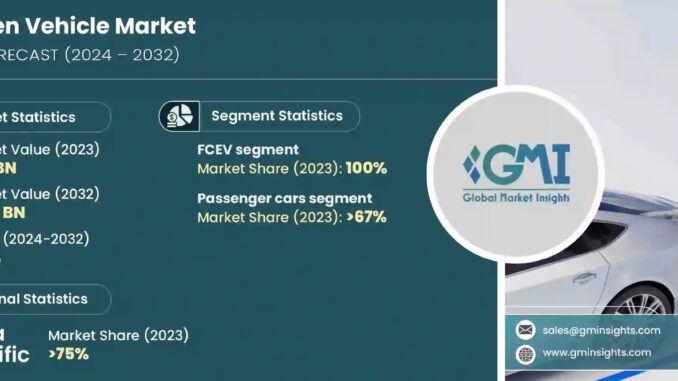
The hydrogen vehicle market was valued at USD 1.8 billion in 2023 and is projected to be worth USD 17.4 billion by 2032, according to recent report by Global Market Insights Inc.
Global hydrogen vehicle market will infer over 28% CAGR from 2024 to 2032, attributed to substantial investments pouring in from automakers, tech firms, and government entities. These investments are not just numbers; they’re catalyzing pivotal research & development initiatives, broadening infrastructure horizons, and amplifying the networks for hydrogen production & distribution.
Trend in Hydrogen vehicle market
Highlighting the trend, in May 2024, ULEMCo, a firm hailing from Liverpool and specializing in the hydrogen fuel conversion of commercial vehicles, clinched a funding boost exceeding USD 5.4 million. Their innovative ‘dual fuel solution’ (H2CED) empowers heavy-duty vehicles to predominantly run on hydrogen, with the flexibility of diesel as a backup.
This groundbreaking strategy not only facilitates fleet operators in their shift to a greener fuel but also promises a significant reduction in carbon emissions, all without necessitating a complete vehicle overhaul.

The overall Hydrogen Vehicle Market is classified based on Vehicle, Powertrain Configuration, Vehicle Class, and Region.
The market’s segmentation based on powertrain configuration reveals a clear dominance of the FCEV segment, which currently holds a 100% market share and is poised for growth by 2032. This surge can be attributed to heightened awareness regarding deteriorating air quality and the noise pollution from both public and private vehicles.
The global pivot from traditional fuel vehicles to eco-friendly alternatives is evident, and it’s driving the demand for hydrogen vehicles. Contributing factors include stringent environmental regulations, government-backed incentives championing clean fuel adoption, and a rising concern over harmful emissions from combustion engines.
Passenger cars and commercial vehicles are the two primary categories in the hydrogen vehicle market. In 2023, passenger cars commanded a dominant share of over 67%. The uptick in hydrogen-powered passenger cars can be linked to growing environmental concerns, advancements in infrastructure, and leaps in technology. Moreover, the concerted efforts from automakers, bolstered by government backing, pilot initiatives, and collaborative endeavors across the industry, are propelling this growth.
Hydrogen-powered passenger cars present a compelling case for consumers, offering a blend of sustainability and efficiency in transportation. This allure is undeniably fueling the broader market growth. Globally, governments are rolling out a suite of policies, incentives, and subsidies, all aimed at championing the cause of hydrogen-powered vehicles, especially passenger cars.
The Market for Vehicles
In 2023, the Asia Pacific region emerged as a dominant player in the hydrogen vehicle market, clinching a commanding share of over 75%. Trailblazers like Japan and South Korea are at the forefront, establishing expansive hydrogen refueling networks and pioneering green hydrogen production technologies.
Such infrastructural strides are pivotal, alleviating concerns like range anxiety and refueling challenges, thus propelling market growth. Furthermore, supportive government policies and incentives in these nations amplify the momentum, underscoring the feasibility and appeal of hydrogen-powered transportation.
Major Players in Hydrogen Vehicle Market
Major players operating in the hydrogen vehicle market are Ballard Power Systems, BMW, Daimler AG (Mercedes-Benz), Honda Motor Co., Ltd, Hyundai Motor Company, ITM Power, Linde plc, Nel Hydrogen, Nikola Corporation, Plug Power Inc, Toyota Motor Corporation.
Source – https://www.gminsights.com/industry-analysis/hydrogen-vehicle-market